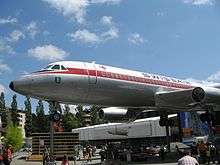Swiss Museum of Transport
The Swiss Transport Museum or Verkehrshaus der Schweiz (literally "Transportation House of Switzerland") in Lucerne opened in July 1959 and exhibits all forms of transport, including locomotive, automobiles, ships, and aircraft) as well as communication technology. It is Switzerland's most popular museum.[1] The museum also maintains a large collection of work by Hans Erni, a local painter and sculptor.

There are several other attractions in the museum besides the collection, including a planetarium, a large-format cinema and a 1:20,000 scale aerial photograph of Switzerland.
Notable Exhibits
Railway
- Rolling stock of the Spanisch Brötli Bahn (literally "Spanish bread roll railway"), the first Swiss railway company
- The SBB Ae 8/14 of the 1930s, the most powerful electrical engine of that time
- A H0 gauge model of the Gotthard railway line (section Erstfeld to Göschenen)
Automobiles
- An exhibition hall with cars from different eras. The external walls of the exhibit are with 344 used Swiss road signs.
Aviation
- a Convair Coronado
- the only existing Lockheed Orion single-engine airliner
- countless other aircraft
Space
It also houses EURECA, a 4.5 tonne satellite, which is among the few space objects returned safely to earth.
A Spacelab pallet was handed over to the Museum for permanent display on 5 March 2010. The pallet, nicknamed Elvis, was used during the 8-day STS-46 mission, 31 July - 8 August 1992, when ESA astronaut Claude Nicollier was on board Shuttle Atlantis to deploy ESA's European Retrievable Carrier (Eureca) scientific mission and the joint NASA/Italian Space Agency Tethered Satellite System (TSS-1). The Pallet carried TSS-1 in the Shuttle's cargo bay.[2]
Access
The museum is located on the shore of Lake Lucerne in the northern section of the city of Lucerne, some 30 minutes walking time from the town centre. It is served by trains of the Lucerne S-Bahn at the adjacent Lucerne Verkehrshaus railway station, by boat services of the Schifffahrtsgesellschaft des Vierwaldstättersees on the lake, and by the Lucerne trolleybus system. All three provide convenient connections with central Lucerne.[3]
See also
Gallery
References
- "Switzerland's Museum of Transportation". Switzerland Tourism. Retrieved 2014-05-19.
- "ESA hands over a piece of space history".
- "Getting there & Layout". Swiss Museum of Transport. Retrieved 2013-01-16.



